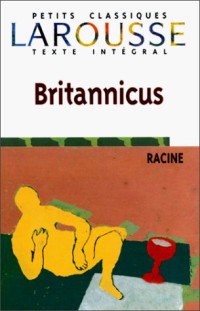
Britannicus by Jean Racine Une mère autoritaire et possessive, un fils sournois et pervers, un vertueux demi-frère par alliance, une jeune fille enlevée en pleine nuit, un gouverneur dont on a bien du mal à savoir s'il est un noble caractère ou un politique imbécile... Nous sommes dans le palais de Néron, où se déchaînent la violence, le sadisme, la cruauté. Qui l'emportera, de Néron, l'empereur, ou de Britannicus, l'héritier légitime ? Agrippine saura-t-elle retenir la main criminelle de ce monstre naissant, ce fils qui commence à vouloir l'écarter du pouvoir ? La présence de la célèbre empoisonneuse Locuste doit-elle nous inquiéter, cependant que Néron convie Britannicus à un banquet de réconciliation ? Racine nous invite à regarder et à écouter ces personnages qui se haïssent et s'affrontent dans les sphères du pouvoir. Racine, inactuel ? Qui oserait sérieusement le soutenir ?
Britannicus by Jean Racine Une mère autoritaire et possessive, un fils sournois et pervers, un vertueux demi-frère par alliance, une jeune fille enlevée en pleine nuit, un gouverneur dont on a bien du mal à savoir s'il est un noble caractère ou un politique imbécile... Nous sommes dans le palais de Néron, où se déchaînent la violence, le sadisme, la cruauté. Qui l'emportera, de Néron, l'empereur, ou de Britannicus, l'héritier légitime ? Agrippine saura-t-elle retenir la main criminelle de ce monstre naissant, ce fils qui commence à vouloir l'écarter du pouvoir ? La présence de la célèbre empoisonneuse Locuste doit-elle nous inquiéter, cependant que Néron convie Britannicus à un banquet de réconciliation ? Racine nous invite à regarder et à écouter ces personnages qui se haïssent et s'affrontent dans les sphères du pouvoir. Racine, inactuel ? Qui oserait sérieusement le soutenir ?
المزيد...



